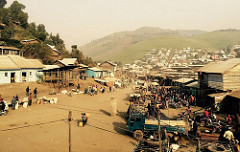
Section 1502 of the Dodd-Frank Wall Street Reform and Consumer Protection Act (Dodd-Frank 1502) and the U.S. Securities and Exchange Commission’s (SEC) Conflict Minerals Rule have improved global minerals supply chain transparency and begun to help break links between the minerals trade and violent conflict in the eastern Democratic Republic of Congo (Congo).
“The link between minerals and violence was something that became obvious, in a sense. The [sexual violence] victims were all coming in for treatment from areas with very active mining.”
– Lubula Igomokelo, Panzi Foundation
For nearly two decades, illicit mining and minerals trafficking – primarily in tin, tantalum, tungsten, and gold (“3TG”) – have provided significant financing to a range of armed groups as well as corrupt and abusive elements of the Congolese army. Minerals were not among the initial causes of Congo’s armed conflict, but they have fueled many of the groups that have perpetrated serious crimes there. The ties between illicit mining and violence are also distinctly regional in nature. Smuggling, trafficking, and illegal minerals taxation in Congo and the region implicate authorities and criminal networks in neighboring countries including Rwanda, Uganda, and Burundi.
Read more in the Enough Project’s latest report, “Point of Origin: Status Report on the Impact of Dodd-Frank 1502 in Congo.”
What has changed?
Based on 2015 and 2016 field research in eastern Congo with miners, traders, human rights activists, civil society leaders, foreign industry experts, and others, the Enough Project found positive advances corresponding to the stated purpose of Section 1502 such as increased security for civilians in some mining areas, a significant reduction in armed group control in 3T mining areas, improved safety and health standards for miners in some mining areas, organized local advocacy in support of reforms, in-region development initiatives, and the initial implementation of the region’s first system to assess mines and certify minerals as conflict-free.
Key Facts*
- Multi-stakeholder teams have assessed 193 mines in eastern Congo on conflict and child labor issues, 166 of which have passed the assessments.
- According to records and interviews in Congo’s North Kivu Mining Ministry, a record amount of certified conflict-free tantalum was exported from eastern Congo in 2015 – 948 tons, a 19 percent increase over the 2014 record, and a 387 percent increase over 2013.
- 70 percent of tin, tantalum, and tungsten mines assessed by IPIS in 2014 were conflict-free.
“Before, mining was almost fully controlled by armed groups…Today, let’s admit they shy away from doing that. And if we’re honest, part of that is because of Dodd-Frank. It came to shine a light on those illicit actors…”
– Justine Masika Bihamba, Women’s Synergy for Sexual Violence Victims
Enough also found that a number of problems remain, including ongoing security threats in communities near mines, especially gold mines, corruption in the traceability system, limited access to formal markets or alternative livelihoods by artisanal miners, an insufficient number of legal artisanal mining zones, and continued minerals smuggling, especially from eastern Congo into Rwanda.
Dodd-Frank 1502 and related reforms are an important part of a much broader peacebuilding and good governance effort in Congo that must be further expanded. Reforms in support of better governance and security, justice for atrocity crimes, and free and fair elections in 2016 are also critical for the achievement of goals like local economic growth and security. The impact of mining reforms and conflict minerals disclosure reports cannot be accurately measured without those other factors in mind. In order to preserve positive momentum and address problems, policymakers, companies, civil society, and justice officials should take specific actions outlined below. A conflict-free minerals trade that benefits the population is possible for the Great Lakes region, and more must be done to build on initial successes and meet urgent needs.
“When the Dodd-Frank Act passed, I sensed a business opportunity. Dodd-Frank could be the impetus for developing, in the DRC, an innovative and socially sustainable source of conflict-free tantalum.”
– Congressional testimony of Per-Olof Loof, CEO of KEMET
What can be done in the United States?
Government – The U.S. government, in particular U.S. Special Envoy to the Great Lakes Region Tom Perriello, can do its part by:
- Combatting smuggling by supporting the International Conference on the Great Lakes Region’s Independent Mineral Chain Auditor and pressuring regional governments – including Rwanda and Uganda – to improve law enforcement related to trafficking and smuggling.
- Improving security for Congolese miners through anti-corruption trainings for mining police, and improve protection for activists
- Helping increase transparency throughout global minerals supply chains through enforcement of Dodd-Frank 1502; urging the Congolese government to increase the number of artisanal mining zones; and facilitating protection for civil society, activists, and corruption whistleblowers
- Supporting comprehensive alternative livelihoods programs
Companies – Corporate entities can contribute to solutions by:
- Increasing in-region sourcing
- Supporting the formalization of artisanal mining and development of more alternative livelihoods projects in eastern Congo
Activists – Anyone can play a positive role by:
- Calling on the U.S. government and especially Representatives in Congress to ensure the successful implementation of Dodd-Frank 1502 and prevent attempts to weaken the provision
- Asking jewelry, tech, and other consumer product companies about their policies on conflict minerals, and express consumer support for products made from conflict-free minerals from Congo
- Passing school, city, or state level procurement resolutions that favor companies working to source conflict-free minerals from Congo for their products. Find out more at www.conflictfreecampus.org
*More details and sources can be found in Enough’s latest Dodd-Frank 1502 report, “Point of Origin: Status Report on the Impact of Dodd-Frank 1502 in Congo,” and in the report’s companion piece published on Medium, Boom Town: What Happened When Wall Street Reform Came to Congo’s Frontier Mining Towns.
Photo credit: Rubaya Town, Holly Dranginis / Enough Project

